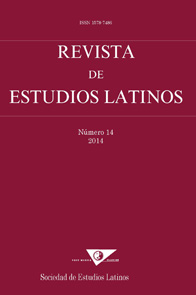Some cases of parasynonym beetween imperare and iubere
DOI:
https://doi.org/10.23808/rel.v14i0.87701Keywords:
authority; order; semantics; synonymyAbstract
Imperare and iubere may come out the same in translation, but the fact that both verbs exist raises the question of the extent to which they are indeed synonymous. Exhaustiveness being impossible, we focus on common usages in the main fields of social life: political decision-making (populus imperat / iubet), psychology (amor imperat / iubet) and philosophy (natura imperat / iubet). A certain consistency emerges in the case of imperare, expressing authority deriving from a hierarchic superiority which is not shared but expects obedience, being founded on deep forces, whether principles or passions. The use of iubere is more complex: it may be a question of authority, but to a lesser degree, and will apply for example to particular provisions of lex rather than to the underlying legal principle itself. This will that such and such should happen may be obliged to compromise with other forces (populus iubet, senatus decernit) or to make its own way, and is rather a matter of incentive. These differences are well documented but not, of course, systematic.
Downloads
Downloads
Published
How to Cite
Issue
Section
License
Copyright (c) 2014 Revista de Estudios Latinos

This work is licensed under a Creative Commons Attribution-NonCommercial-NoDerivatives 4.0 International License.
The originals published in the printed and electronic editions of this journal are the property of the Revista de Estudios Latinos and can be circulated as long as the original source and authorship is made clear in any reproduction, full or partial, of the same, and as long as this is not done for commercial purposes.






